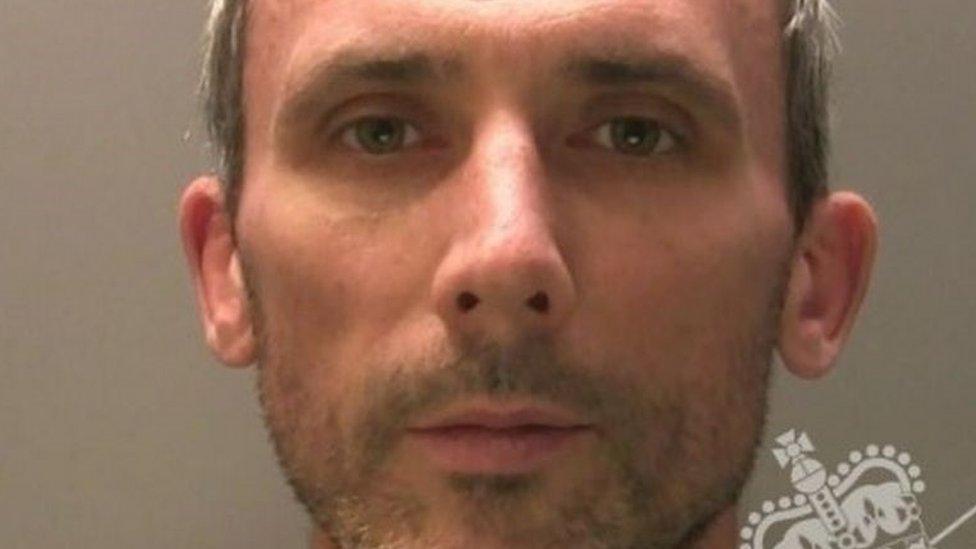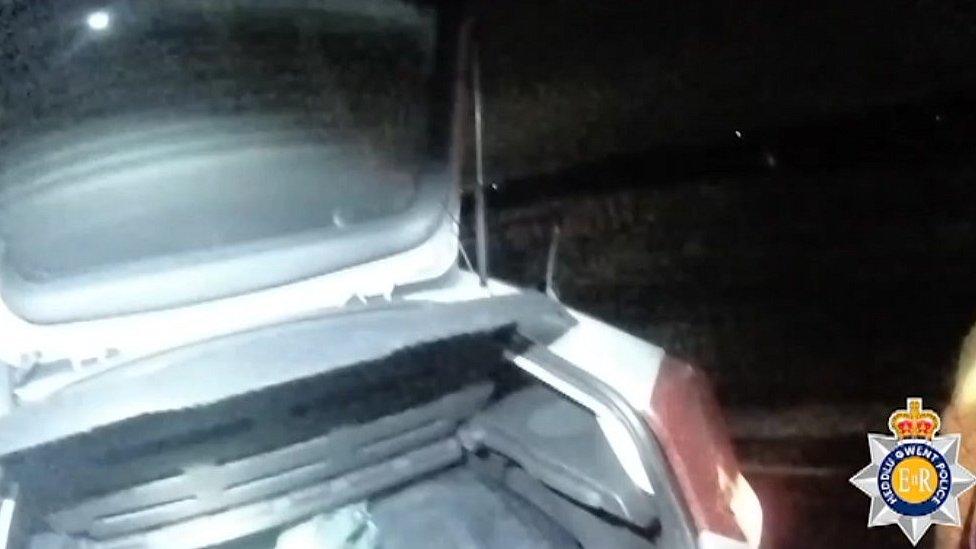Chepstow dentist stalked by Bristol patient feels 'constant threat'
- Published
"When it comes to the law I feel let down"
A dentist who was secretly stalked by a disgruntled patient for nearly four years says he feels "let down by the law" after learning the man will be released from prison within weeks.
Thomas Baddeley, 42, was arrested within a mile of Ian Hutchinson's home in Monmouthshire.
He had what prosecutors called a "murder kit", including a crossbow.
He got an indefinite restraining order but faced a lesser charge because his victim was unaware he had been stalked.
Baddeley was spotted in November 2019 by a concerned passer-by in his car, wearing a balaclava.
Police found a large knife, a crossbow with bolts, black ski mask, bleach and a hammer in his Citroen. His car seats were covered in plastic sheeting.
When did the stalking start?

Tom Baddeley started stalking Ian Hutchinson before his treatment ended
Baddeley, 42, had been treated by Dr Hutchinson at his former Bristol dental practice from 2012 to 2016.
He had some teeth removed and was fitted with braces.
But he was unhappy and claimed the treatment was poisoning him.
When the treatment ended in early 2016, Dr Hutchinson expected a complaint but it never came and he heard nothing further from Baddeley.
But documents found by police in Baddeley's home in Montpelier, Bristol, and in his car revealed he had been following Dr Hutchinson since a few months before his treatment ended, including detailed plans leading up to something he described as "the event".

Police searching Baddeley's car last November
This is what police found:
"Surveillance logs" detailing Dr Hutchinson's personal and professional movements over the ensuing years
They showed Baddeley had followed him to his Chepstow practice, to dental conferences and courses around the UK
Baddeley purchased then abandoned about 30 different cars in a bid to evade detection as he conducted "systematic surveillance" of his victim
Notes planning for "the event" included the location of CCTV cameras, how not to leave fingerprints and how to answer police questions
What happened in court?
Baddeley was jailed for 16 months at Cardiff Crown Court in August after admitting stalking without fear, alarm or distress, and two offences of possessing offensive weapons.
An indefinite restraining order was imposed, including a ban on entering parts of Monmouthshire, with Baddeley facing up to five years' imprisonment if he breaches it.
Judge Jeremy Jenkins told him: "I am in no doubt you intended to cause some harm to Dr Hutchinson.
"It is difficult to envisage a more serious case than this of its kind."

But Baddeley avoided a longer jail term because the law stipulates a victim must be aware they are being stalked.
As Dr Hutchinson was unaware, prosecutors had no option but to impose a lesser charge.
'To hell and back'
Dr Hutchinson, 52, has been told Baddeley is likely to be released from prison on licence in the coming weeks, due to time served on remand.
In his victim impact statement to the court, Dr Hutchinson said: "I believe I will be looking over my shoulder expecting Baddeley to be nearby for the rest of my life."
I feel as though he knows everything about me and my family and there's nothing we can do about it.
In an exclusive interview, he told BBC Wales he had been "to hell and back" as a result of the case and felt in a state of "constant threat".
The severity of the situation came home to him when undercover police arrived unexpectedly at his surgery, warning he would be taken to a "safe house" if Baddeley was released on bail pending the court case.
"When he gets released, I'll get a warning," said Dr Hutchinson, a former chairman of the British Lingual Orthodontic Society, who teaches dentistry throughout the UK.
"They've reassured me that the restraining order is very thorough, but at the end of the day it's simply a piece of paper."
Dr Hutchinson has implemented security measures at his home and dental practice since the case.
"I've got my team to look after my patients," he said.
"The police just turn around and say 'we really recommend you change your name, move, and change jobs'.
"I've spent over 20 years refining, learning, now I'm passing it on to others by teaching and I can't just simply disappear - I can't just change everything."
Dr Hutchinson said he now fears after Baddeley's "slap on the wrists" that something more will happen.
"I'm constantly looking over my shoulder. I feel as though he knows everything about me and my family and there's nothing we can do about it," he said.
"It's altered both my personal life and professional life, and it won't be the same again."
I've been in practice for 21 years now and I have never come across a case like this
Prosecuting barrister Nigel Fryer told the court that, while there was no specific reference to murder in the notebooks found in his home and car, there was "strong circumstantial evidence" that this was what "the event" was referring to.
When asked about this during police interviews, Baddeley replied "no comment".
Mr Fryer told BBC Wales that Baddeley's true motive "remains a mystery".
"I've been in practice for 21 years now and I have never come across a case like this," he said.
"It was extremely unusual, because ordinarily the perpetrator of an offence like this will derive satisfaction from making the victim's life hell - they will be very visible - but this is almost a unique case where someone is the complete opposite, who doesn't wish to be seen and went to such detailed and meticulous ways to cover his tracks.
"In interview, he said the satisfaction he got was from knowing he was watching Dr Hutchinson, but he didn't know… that was the kick that he got out of it."
The fact that his victim was unaware meant Baddeley could not be charged with a more serious stalking offence, which would carry a maximum jail term of 10 years.
Dr Hutchinson said: "When it comes to the law, I do feel let down… it's the shoulder shrug, 'sorry, there's a loophole, nothing more we can do'.
"I'm just left there hung out to dry thinking, 'how am I going to manage this?'
"The charges, I feel, are a complete mockery. This was a blatant attempt at kidnap or murder and it was purely by good luck that I was late home and it didn't happen.
"I think the law needs to be changed… we need more protection from people like this."
Mr Fryer said while he had "the utmost sympathy" for Dr Hutchinson, it had proved "impossible" to charge Baddeley with a more serious offence, based on the facts of the case and the available evidence.
"The various charges were looked at… and the conclusion was reached that this was the correct charge within the law as it currently stands," he added.
'Stalk the stalker'
Dr Jane Monckton-Smith, a forensic criminologist and stalking expert at the University of Gloucester, said the damage to Dr Hutchinson was "inestimable" and the case highlighted gaps in current legislation.
"I think our stalking legislation has been problematic from the beginning because there is no real strict legal definition of what stalking is… and when you get a case like this you really come up against some of those problems," she said.
If we're not going to give them long jail sentences where they can get the treatment some of them need, then we need to be monitoring them
"One thing the legislation tells us is that to get the highest sentence, which reflects the most dangerous stalking, the victim has to have been frightened or alarmed, or at the very least harassed, by the behaviour, they have to have been frightened of violence.
"And of course in this case, the threat to the victim was really off the scale, but because he didn't know, it's almost treated in the criminal justice system as if it was a lesser offence.
"Once he'd been told (about the stalking) his whole relationship with safety changed in that second, because he then realised he'd been in danger, potentially, all this time."
Dr Monckton-Smith called for a system of multi-agency monitoring for stalking offenders on their release from prison.
"We need to have processes in place that… stalk the stalker," she said.
"If we're not going to give them long jail sentences where they can get the treatment some of them need, then we need to be monitoring them and tracking them and making sure they don't continue to stalk and harass their victims."
In a statement, the Home Office said: "Stalking is a distressing crime and we're determined to tackle it.
"We introduced Stalking Protection Orders in January, which protect victims and address the perpetrator's behaviour at the earliest opportunity. We've also doubled the maximum sentences for stalking and harassment to 10 years.
"Stalkers are closely monitored by the probation service and police and if there is concern about their risk to the public they can be recalled to prison. Victims are also informed about the stalker's licence conditions in advance of their release."
- Published19 January 2020

- Published25 February 2019
